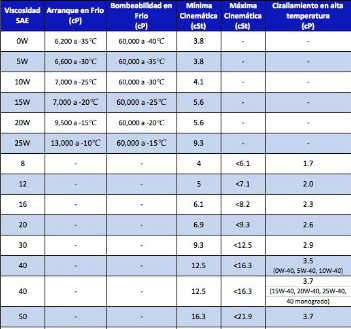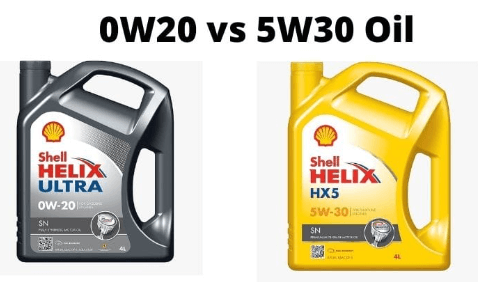No, you should not use 0W-20 instead of 5W-30 if your owner’s manual recommends a thicker oil. Using a thinner oil can potentially damage your engine.
It’s important to follow the manufacturer’s guidelines for optimal performance and to protect your vehicle.
1. Understanding The Differences Between 0w-20 And 5w-30
When it comes to choosing the right motor oil for your vehicle, understanding the differences between various viscosity grades is important. In this section, we will explore the differences between 0W-20 and 5W-30, two commonly used motor oils.
Definition Of Viscosity Grades
Viscosity is a measure of a fluid’s resistance to flow. In the context of motor oil, viscosity determines how well the oil can flow at different temperatures. Viscosity grades are represented by a combination of numbers and letters, such as 0W-20 and 5W-30.
Comparison Of Viscosity Ratings For 0w-20 And 5w-30 Oils
Let’s take a closer look at the two viscosity grades:
| Viscosity Grade | Temperature Range | Flow Characteristics |
|---|---|---|
| 0W-20 | 0 degrees Fahrenheit to 100+ degrees Fahrenheit | Thinner oil, flows more easily at low temperatures |
| 5W-30 | 0 degrees Fahrenheit to 100+ degrees Fahrenheit | Slightly thicker oil, provides better protection at high temperatures |
As you can see, both 0W-20 and 5W-30 oils are designed to perform well in a wide temperature range. However, there is a difference in their flow characteristics, with 0W-20 being thinner and 5W-30 being slightly thicker.
Importance Of Viscosity In Lubrication
The viscosity of motor oil plays a crucial role in lubricating and protecting engine components. A proper viscosity ensures that the oil can flow smoothly through the engine, reducing friction and wear. Using the recommended viscosity grade specified in your owner’s manual is crucial to ensure optimal engine performance and longevity.
If your owner’s manual calls for a thicker oil, such as 5W-30, it is not recommended to use a thinner oil like 0W-20. The thicker oil provides better protection for certain engines and operating conditions. Similarly, using a thicker oil when a thinner oil is recommended can negatively impact engine performance and fuel efficiency.
It’s important to follow the manufacturer’s recommendations regarding viscosity grades to ensure your vehicle’s engine operates at its best. Consult your owner’s manual or consult with a qualified mechanic to determine the correct viscosity grade for your specific vehicle.
2. Manufacturers’ Oil Recommendations
Automotive manufacturers provide specific oil recommendations for each vehicle model to ensure optimal performance and longevity. These recommendations are based on extensive research and testing conducted by the manufacturer’s engineering teams. It is important to understand and follow these recommendations to maintain the integrity of your vehicle’s engine.

Explanation Of Automotive Manufacturers’ Specifications
Automotive manufacturers specify the appropriate oil viscosity for their vehicles based on various factors such as engine design, operating temperatures, and performance requirements. The specifications are typically indicated in the vehicle’s owner’s manual.
The viscosity of an oil determines how readily it flows at different temperatures. The Society of Automotive Engineers (SAE) assigns numerical values to different oil viscosities. For instance, 0W-20 and 5W-30 are two common oil viscosities.
The first number in the viscosity rating, such as 0W or 5W, represents the oil’s flowability at low temperatures (W stands for winter). The lower the number, the better the oil flows during cold starts. The second number, such as 20 or 30, represents the oil’s flowability at higher operating temperatures. Higher numbers indicate thicker oils that can provide better protection at higher temperatures.
Importance Of Following Manufacturer Recommendations
Following the oil recommendations specified by your vehicle’s manufacturer is crucial for several reasons:
- Optimal engine performance: Manufacturers have studied their engines extensively and determined the oil viscosity that works best for their specific designs. Using the recommended oil ensures that your engine operates at peak performance levels.
- Improved fuel efficiency: The right oil viscosity allows for better lubrication and reduced friction within the engine. This leads to improved fuel efficiency and helps you save money on gas.
- Enhanced engine protection: Engine components such as pistons, bearings, and camshafts require adequate lubrication to function properly. Using the recommended oil viscosity ensures that these components receive the appropriate protection, reducing the risk of premature wear and potential damage.
- Warranty compliance: Failure to follow the manufacturer’s oil recommendations may void your vehicle’s warranty. Manufacturers can deny warranty claims if they find that improper oil was used, potentially leaving you to bear the cost of repairs.
Therefore, it is essential to adhere to the manufacturer’s oil viscosity recommendations to maintain the overall health and performance of your vehicle’s engine.
By utilizing the information provided by the manufacturer, you can confidently select the correct oil viscosity for your vehicle and promote the longevity of your engine.
3. Performance In Different Weather Conditions
When it comes to selecting the right motor oil for your vehicle, understanding its performance in different weather conditions is crucial. The viscosity rating provided by the Society of Automotive Engineers (SAE) helps determine how oil flows at different temperatures. In this section, we will explore the effects of temperature on oil viscosity and compare the performance of 0W-20 and 5W-30 oils in both cold and hot weather conditions.
Effects Of Temperature On Oil Viscosity
The viscosity of oil refers to its resistance to flow. Higher viscosity oil tends to be thicker and offers better protection under high temperatures and heavy loads. On the other hand, lower viscosity oil flows more easily in colder conditions to ensure proper lubrication. The numbers associated with multi-grade oils, such as 0W-20 and 5W-30, represent their viscosity at different temperatures.
Performance Of 0w-20 Vs. 5w-30 In Cold Weather
In cold weather, where low temperatures can cause oil to thicken, the starting viscosity becomes crucial. The “W” in the oil grade indicates its winter suitability. Comparing 0W-20 and 5W-30, the former has a lower low-temperature viscosity and provides better flow at colder temperatures. This means that 0W-20 oil will flow more easily, ensuring faster lubrication during cold engine starts. It helps protect critical engine components and reduces wear and tear, enhancing overall performance.
Performance Of 0w-20 Vs. 5w-30 In Hot Weather
Hot weather conditions place tremendous stress on engine oils due to increased temperatures. Here, the higher number in the oil grade becomes significant. Compared to 0W-20, 5W-30 oil has a higher high-temperature viscosity, providing better protection against heat-related breakdown. It maintains its strength and lubricating properties, even in extreme heat, supporting smoother engine operation and reducing the risk of engine damage.
Remember that using the recommended viscosity as stated in your vehicle’s owner’s manual is crucial for optimal performance and engine longevity. While both 0W-20 and 5W-30 oils have their advantages in different weather conditions, it is essential to follow the manufacturer’s guidelines to ensure proper lubrication and protection for your specific vehicle.
4. Engine Wear And Protection
Understanding The Impact Of Oil Viscosity On Engine Wear
Oil viscosity plays a crucial role in protecting your engine from wear and tear. Viscosity refers to the oil’s thickness and its ability to flow under different temperatures. When it comes to choosing the right oil for your engine, understanding the impact of viscosity is essential.
Engines contain numerous moving parts that require proper lubrication to minimize friction and heat. Using the wrong oil viscosity can result in inadequate lubrication, leading to increased wear on these components. If the oil is too thin, it may not provide sufficient protection, especially during high temperatures or heavy load conditions. Conversely, using oil that is too thick can hinder flow, potentially depriving engine parts of the lubrication they need.
Benefits Of Using Recommended Viscosity Oil
Using the recommended viscosity oil, as stated in your vehicle’s owner’s manual, offers several benefits for engine wear and protection.
- Optimal Lubrication: The recommended viscosity oil ensures that all engine components receive the proper lubrication they need, reducing friction and wear.
- Improved Fuel Efficiency: The right oil viscosity allows the engine to operate more efficiently, leading to better fuel consumption and performance.
- Enhanced Engine Lifespan: By using the specified viscosity, you can help prolong your engine’s lifespan, preventing premature wear and damage.
- Consistent Performance: The correct viscosity oil maintains consistent oil pressure, ensuring all engine parts function smoothly, even under varying temperatures and conditions.
Risks And Potential Damage From Using The Wrong Oil Viscosity
Using the wrong oil viscosity can be detrimental to your engine’s health and performance. It’s important to understand the risks and potential damage that can arise from such a mistake.
1. Poor Lubrication: When using oil that is too thin, the engine’s moving parts may not receive adequate lubrication. This can result in increased friction, heat, and wear, potentially leading to expensive repairs.
2. Inadequate Protection: Thicker oil than recommended can hinder the flow, preventing it from reaching all the necessary engine parts. This can result in insufficient lubrication, leading to accelerated wear and reduced engine performance.
3. Reduced Fuel Efficiency: The wrong oil viscosity can negatively impact fuel efficiency by increasing internal friction and causing the engine to work harder than necessary.
4. Potential Engine Damage: Continuous use of the wrong oil viscosity can lead to severe engine damage, including premature wear, increased oil consumption, and potential engine failure.
5. Voided Warranty: Using the wrong oil viscosity may void your vehicle’s warranty, as manufacturers specify the recommended viscosity for optimal engine performance and longevity.
It’s crucial to follow the manufacturer’s guidelines and use the recommended viscosity oil to ensure proper engine wear and protection. By doing so, you can maximize your engine’s lifespan and avoid costly repairs.
5. Fuel Efficiency And Oil Consumption
In the previous sections, we discussed the differences between 0W-20 and 5W-30 oils, including their viscosity and performance in various temperatures. Now, let’s explore how these oil viscosities impact fuel efficiency and oil consumption. Understanding this relationship can help you make informed decisions about which oil to use for your vehicle.
Relationship Between Oil Viscosity And Fuel Efficiency
Oil viscosity plays a crucial role in determining the fuel efficiency of your vehicle. The viscosity rating represents how well the oil flows at different temperatures. Generally, lower viscosity oils, such as 0W-20, offer improved fuel efficiency compared to higher viscosity oils like 5W-30.
This is due to the fact that lower viscosity oils create less resistance as they flow through the engine, allowing it to operate more efficiently. The reduced friction results in less energy wasted, ultimately leading to better fuel economy.
Comparison Of Fuel Consumption Between 0w-20 And 5w-30
When it comes to comparing the fuel consumption between 0W-20 and 5W-30, it’s important to note that the difference might not be significant in everyday driving conditions. The actual impact on fuel economy will vary depending on several factors, such as your driving style, vehicle make and model, and driving conditions.
While 0W-20 oil might provide a slight advantage in fuel efficiency, the difference may not be noticeable unless you have a highly fuel-efficient vehicle or frequently drive in extreme cold weather conditions.
Implications Of Using The Wrong Oil Viscosity On Oil Consumption
Using the wrong oil viscosity can have implications on oil consumption as well. If you use a thinner oil, like 0W-20, in an engine that requires a thicker oil, it may result in increased oil consumption.
Thicker oils provide better protection against engine wear and higher operating temperatures. When used in an engine designed for 5W-30 or similar viscosities, they help create a strong oil film that prevents metal-to-metal contact, reducing friction and ensuring proper lubrication.
On the other hand, using a thinner oil where a thicker oil is required can lead to increased wear and potential engine damage.
In conclusion, while 0W-20 may offer improved fuel efficiency, it’s crucial to adhere to your vehicle’s manufacturer recommendations regarding oil viscosity. Always consult your owner’s manual or contact a trusted mechanic to determine the right oil viscosity for your specific vehicle. This ensures optimal fuel efficiency and reduces the risk of oil consumption issues.
Frequently Asked Questions For Can You Use 0w-20 Instead Of 5w-30
What Happens If I Use 0w-20 Instead Of 5w30?
Using 0W-20 instead of 5W-30 may cause engine damage if not recommended in your owner’s manual. Stick to the suggested oil grade to ensure optimal performance and longevity.
What Is The Difference Between 0w And 5w-30?
0W and 5W-30 both refer to the viscosity rating of engine oil. The main difference is that 0W has a lower viscosity and provides better cold weather protection, while 5W-30 provides better overall protection in hot temperatures. Always follow your vehicle’s manual for the recommended viscosity.
Can You Use 0w 30 Instead Of 5w-30?
No, you should not use 0W-30 instead of 5W-30. It is important to follow your owner’s manual and use the recommended oil viscosity for your vehicle. Using a different viscosity can affect the performance and potentially damage your engine.
What Vehicles Use 0w-20 Oil?
0W-20 oil is primarily used in newer model vehicles, including many Honda, Toyota, Subaru, Nissan, and Lexus models. It is recommended by the manufacturers for improved fuel economy and performance. Be sure to consult your vehicle’s owner’s manual for the correct oil viscosity.
Conclusion
Ultimately, it is not recommended to use 0W-20 instead of 5W-30 if your owner’s manual specifies a thicker oil. Your vehicle has been designed to work optimally with a specific oil viscosity, which helps to ensure proper engine performance and protection.
Using a different oil viscosity could potentially lead to engine damage or inefficiency. Therefore, it is important to follow your vehicle manufacturer’s recommendations for oil viscosity to maintain the health and longevity of your engine.


Leave a Reply